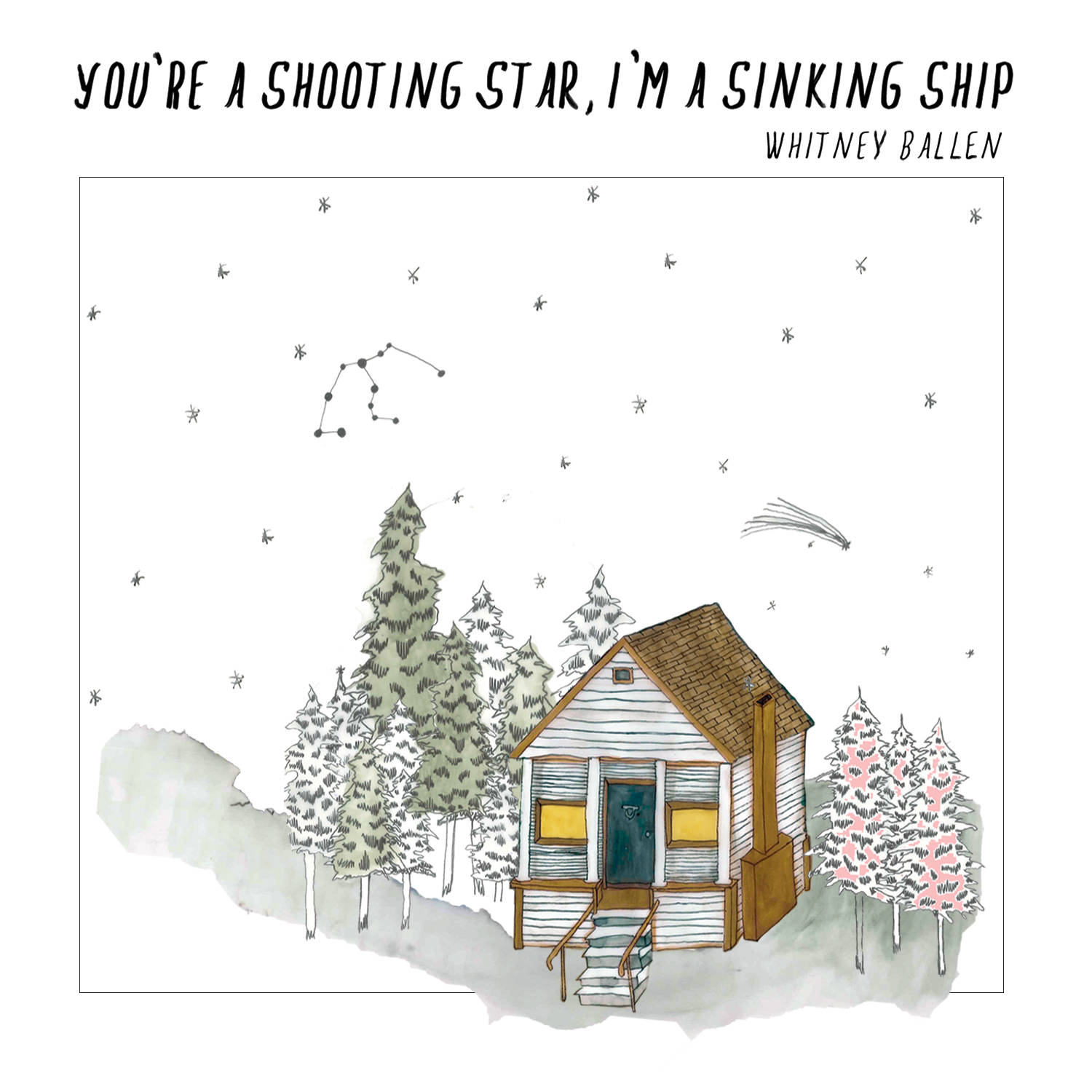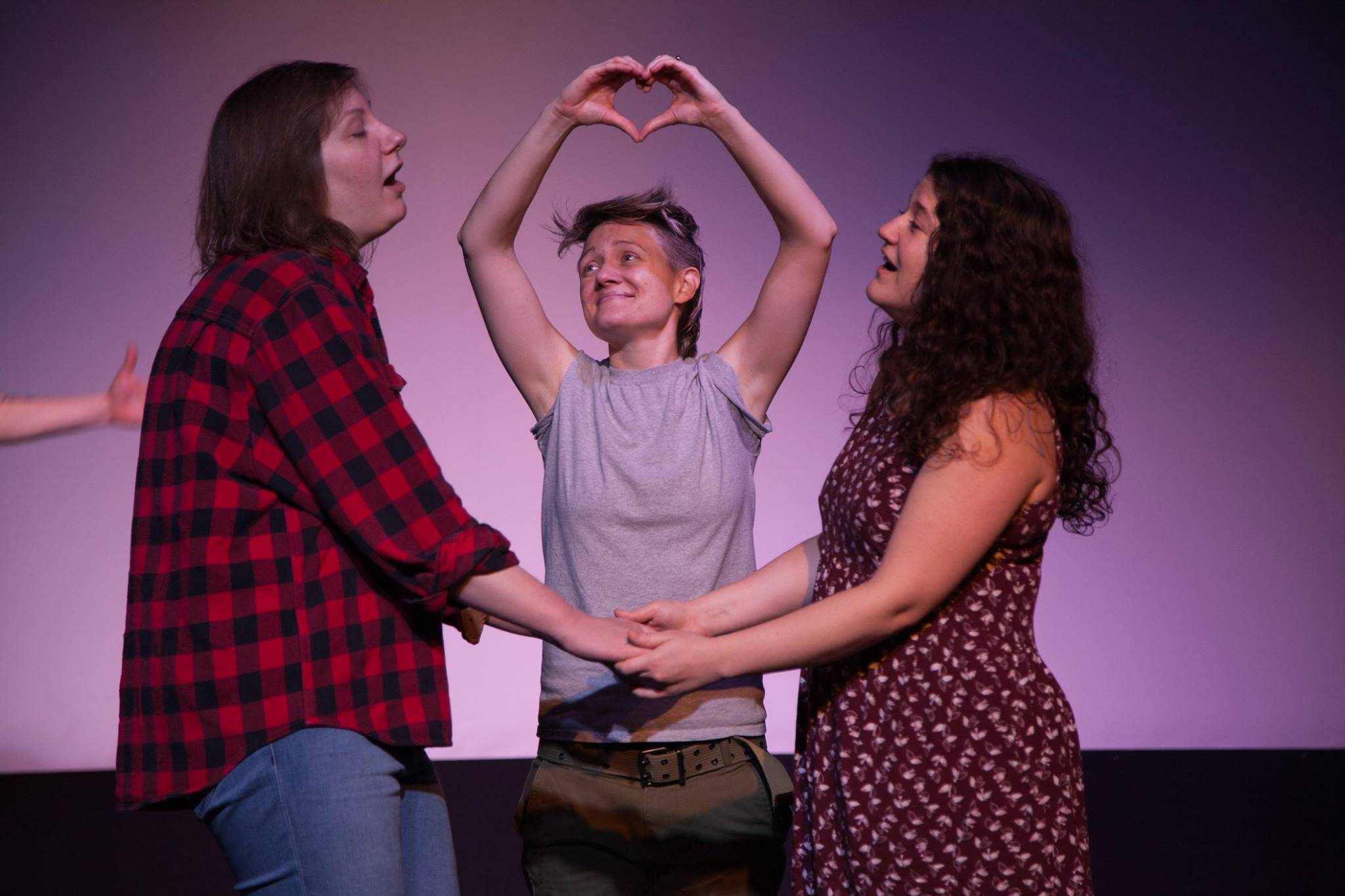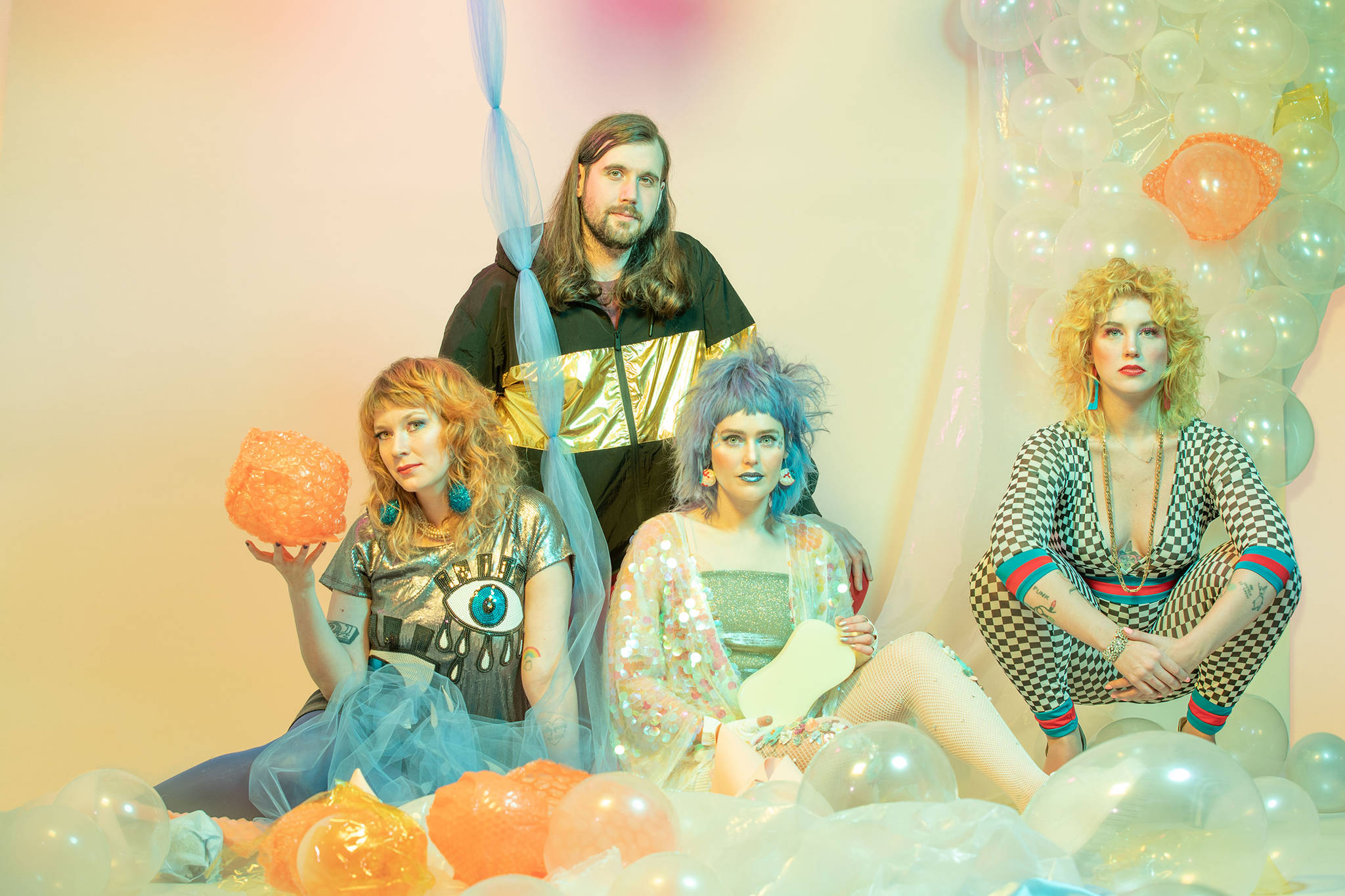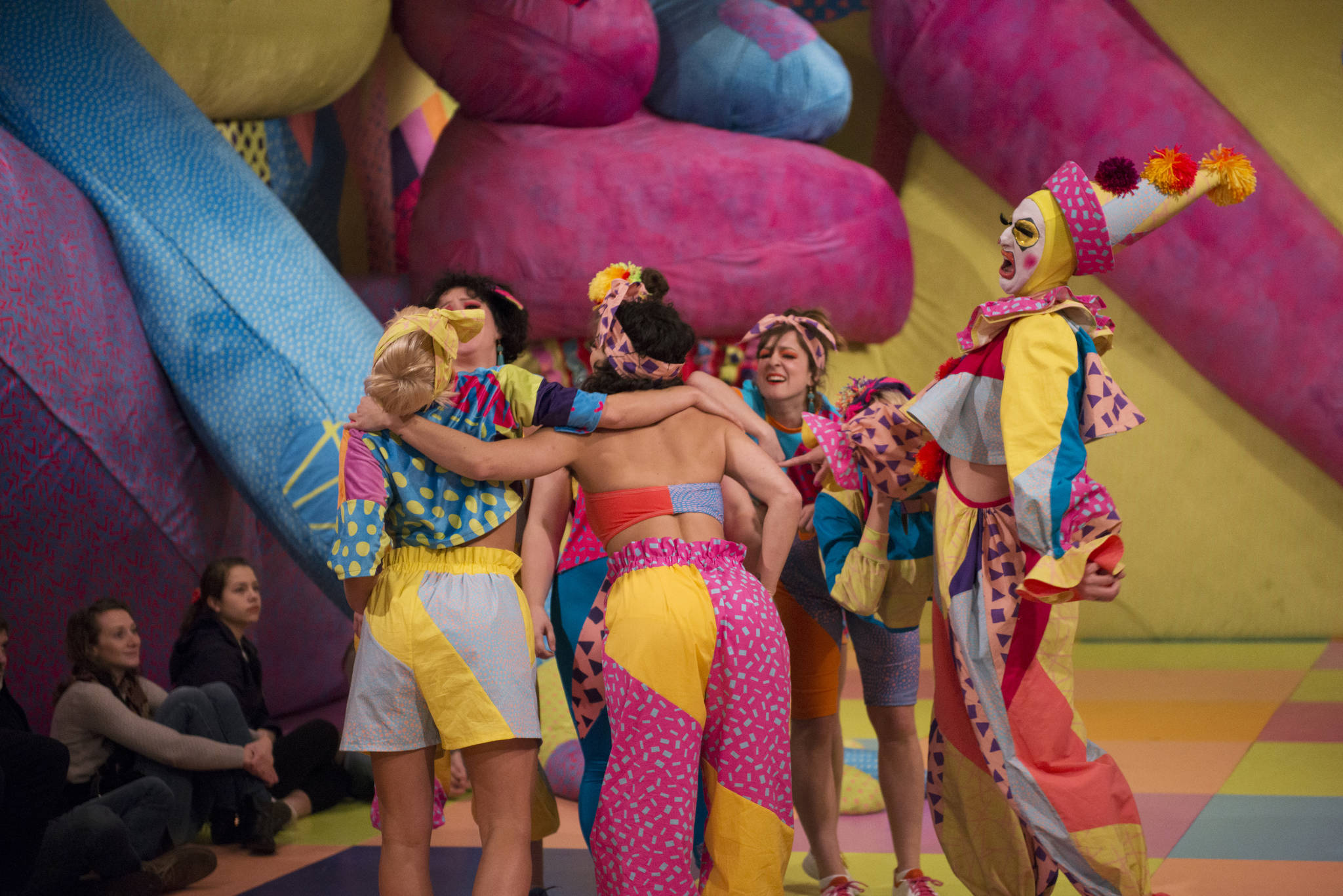There’s something to be said for the intrigue of a discomforting welcome. Issaquah-based singer-songwriter Whitney Ballen greets listeners to her new album with a guitar riff that aurally feels like bugs creeping and crawling over one’s skin, only to be followed by her whispery vocals that send a shiver up the spine before giving way to banshee wails as waves of crashing instrumental sounds build. It’s a jarring introduction that prevents any chance at complacent listening.
You’re a Shooting Star, I’m a Sinking Ship (out August 24 on Father/Daughter Records and Substitute Scene) is a sonic breakthrough for the 27-year-old. While she’s long stood out in the local music scene thanks to a one-of-a-kind voice that’s part mousy murmur, part bashful specter, part warbling yelps, and part nasal crooner, her previous albums (the 2014 LP Falls and 2017 EP Being Here Is Hard) were very much tiny DIY solo collections. You’re a Shooting Star, I’m a Sinking Ship rips off the ceiling and gets expansive.
Recorded in June 2017 at Hall of Justice in Fremont, the album marks a major step forward in Ballen’s musical evolution. Linking up with a full band brings her songwriting to life with a whole new level of depth. Stylistic shifts happen frequently without feeling forced: Tunes like “Black Cloud” and “Nothing” carry foreboding nerves as Ballen’s voice softly lures listeners into a trap where they’re soon jumped by an avalanche of distorted alt-rock noise; golden-toned slide guitar lines buoy indie-folk numbers like “Mountain”; and things throw back to her minimalist solo sound on the album-closing “Beyond Years.” All the while her lyrics struggle with themes of insecurity—feeling lesser than and unworthy while hoping eventually to find a way to escape this mental pit. And unlike past records, Ballen’s voice isn’t buried in reverb, making the emotional connection of her words ring clearer and further underscoring the uniqueness of her voice.
Before Ballen heads to the Sunset this Friday for You’re a Shooting Star, I’m a Sinking Ship’s release show, we caught up with her to chat about fleshing out her sound with a band, the struggles of dating creatives, and sourdough bread.
What did you want this record to sound like compared to your previous albums?
WB: I definitely was going into it knowing that it would be with a full band. The last two were solo. So when I started playing with this group of people, I knew that I wanted these songs to be recorded. I guess I just wanted them to feel more full and bigger than I had written them. That was really the only thing I knew for sure.
What was the approach to achieving that? You’d hinted at bigger, louder sounds on past tracks like “Fall City” or “Torn.”
We recorded most of the songs live in the studio, so our live performance and what I wanted the song to be like on the record, I wanted that to really match. But the songs are performed more so to feeling that any kind of music theory or anything like that. So I was really just trying convey what someone would get from a live performance; to translate that to recordings. Translating feeling to sound.
Do you have any favorite moments on the record?
There were two songs on it—“Black Cloud” and “Nothing”—that I didn’t ever think would fit, because they are just so different from the rest of the songs. But I realized that they kind of have to be there. I kind of like the unexpected.
And then the last song, “Beyond Years,” wasn’t supposed to be on the record. But we were done tracking everything, and then I went over to producer Andy Park’s apartment to do some more mixing. I was telling him this story I had written and turned into a song, and he was like, “You should record it!” And I was like, “We don’t have the time.” But he was like, “Let’s do it!” So we ended up doing it right then and there in a few hours. We added the song to the record, and I feel like it really wraps up everything I wanted the record to have. I wanted the record to have some poppy stuff, and some twangy country-inspired songs, and some really loud distorted songs, but also not forgetting my DIY roots that are still very relevant. And that’s “Beyond Years.”
Were there things sonically that you were mindful of during the album’s creation?
Originally, I had been so used to using reverb on my vocals. I’m not quite sure when that started, but I’d been doing that for a long time; I just thought that’s what sounded better. But then once we tracked everything that way, I was just like, no, that’s just not fitting with these songs. And then we took really all of it out, so the vocals are now pretty up-close in your ear and clean.
I guess at the time I was really into listening to Angel Olsen and a ton of other stuff. But using other people as references sometimes just doesn’t work for because my vocals are not anything like those references. [Laughs]
Since your vocal style is so distinct, how do you like to describe it?
I jokingly will describe it as a 10-year-old’s. When I was in high school, I was in some underage column in The Stranger or some other publication, and whoever was writing it was like, “Holy fuck, this sounds like a 10-year-old. But in, like, a good way.”
But I tend to just describe it in words other people describe it in. Kind of ghostly, but high-pitched, and also piercing sometimes. [Laughs]
One of the themes of the lyricism throughout the album seems to be low status and a lack of confidence, whether in repeated apologies or describing how cool someone else is. What mindset led to those ideas seeping into the songs?
The songs were written probably over a three-to-four-year time period. (Some of them are much older, like “Rainier” I originally had on Falls, but that song just became so relevant and kind of stuck with me, so I wanted to have that be a full-band song.) Throughout that time period, there was a lot of trying to grow and trying to be an “adult,” which I still don’t think works.
I put out a little EP, Being Here Is Hard. Those were one-offs that I knew I didn’t want on a full-band record, because they weren’t full-band songs. But also they just were different and all kind of had to do with one thing.
But songs on You’re a Shooting Star, I’m a Sinking Ship, really were kind of just a culmination of realizing that I’m always going to be comparing myself to the people around me, because we’re humans. Mostly it stemmed from somebody I was in a relationship with that was also in the music world that I saw was getting a lot of opportunities. And they were growing and doing really well. And it was inspiring, but at the same time kind of a shadow. Comparing myself to that in a music and art sense—it’s kind of like a teeter-totter: When other people are high, you’re low.
The irony of the title of the album, and some of the songs and the meaning behind them, is that although it’s super-easy to get down on yourself about where you’re at and what you’re up to, my position in the album title has shifted. When writing the songs I did feel like that other person was that shooting star doing really well, and I’m the one sinking. And I realized that right now I am actually trying to help a sinking ship, which is the person that I originally wrote the entire album about. I’m trying to make them that shooting star again. It’s just shifted. It’s weird. Some role reversal.
So that relationship is still going?
Yeah, but it’s gone through all these things. It’s ironic that what I held high in my head is now in need of a lifesaver.
Relationships between creatives—especially in the same field—are always tricky. You’re kind of always going for the same thing. Even if it’s not quite as direct among musicians as among actors, it’s still the kind of general, “We’re auditioning for the same movie. One of us got it and the other didn’t. I’m supposed to be celebrating because you got this big thing, but I didn’t get this big thing, so I want to cry and eat some ice cream.”
Exactly. Pretty spot-on. It makes it all very relatable, but at the same time each situation is also very personal.
What’s next on the horizon?
We’re a little late on the tour game for this record, but it is something we’re looking to do this fall. I’m not sure exactly what that will look like for us. But following the record [release]—probably in September—we’ll do a little Northwest [tour]: a Portland/Bellingham/Seattle/Olympia situation to get things started.
I’m really looking forward to the release show. I specifically chose the bands that are playing. Snuff Redux is playing, and I know they have other August shows, so that’s technically not wise to do marketing-wise, but the members in the band have been extremely supportive of me personally and all my music and artwork for a very long time. And I knew that I just wanted to be surrounded by people who are very positive and feel the music that I’m releasing.
The other band, Big Buddy, I recently met, and I believe they’re all from San Diego and they recently moved up here. I played at their house recently, and one of them made sourdough bread from scratch for everyone. They were the most wholesome people that I’ve ever met. Immediately they made me feel super-welcome in their home. They’re younger and just so the opposite of people you meet that are from Seattle. [Laughs] They reminded me of my friends growing up.
I wanted the release show to be just a really heartfelt, warm presence. I could’ve gone about it another way and got bands that I knew for sure would bring a ton of people, but I also know those people probably wouldn’t give two shits about what I’m putting out.
Whitney Ballen: You’re a Shooting Star, I’m a Sinking Ship release show
Fri., Aug. 24 at 9 p.m. | Sunset Tavern | $10 | sunsettavern.com









